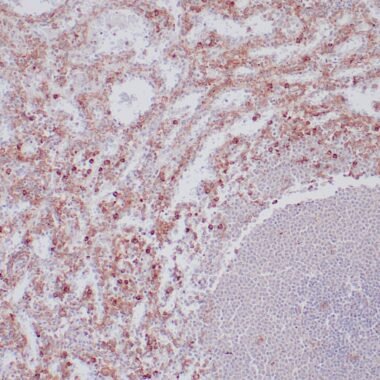
The CD33 Antibody (Mouse Monoclonal, Clone PWS44) is a highly specific and reliable reagent designed for the detection of CD33, a transmembrane sialic acid-binding immunoglobulin-like lectin (Siglec-3) predominantly expressed on myeloid lineage cells, including monocytes, granulocytes, and myeloid progenitors. CD33 is a key marker used in the diagnosis and classification of myeloid leukemias, particularly acute myeloid leukemia (AML), and is an important target in immunotherapy research. Clone PWS44 is a well-characterised mouse monoclonal antibody optimized for immunohistochemistry (IHC) on formalin-fixed paraffin-embedded (FFPE) tissue sections, as well as for cancer research. In IHC, it produces clear membranous and cytoplasmic staining in CD33-positive myeloid cells within bone marrow, spleen, and leukemic infiltrates. This makes it a valuable tool for hematopathologists and researchers studying myeloid neoplasms, immune cell profiling, and tumor microenvironments. The CD33 Mouse Monoclonal Antibody, Clone PWS44, is ideal for use in leukemia diagnostics, myeloid differentiation studies, and preclinical evaluation of CD33-targeted therapies. Its high specificity and reproducibility support consistent performance in both research and diagnostic workflows
Humans; others not tested
Immunohistochemistry (formalin-fixed, paraffin-embedded tissues)
Buffer with protein carrier and preservative
Store at 2ºC to 8ºC
Spleen
Cytoplasmic
IgG2b
Prokaryotic recombinant protein corresponding to a region of the C2 domain of the human CD33 molecule